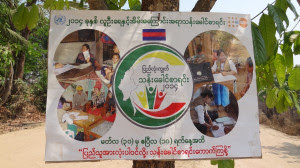Burma’s census discriminates against ethnic Rohingya Muslims by refusing to recognise their existence, according to international rights groups, with even the UN agency tasked with carrying out the census expressing deep concerns.
 A man picks at a bruised piece of fruit, takes a bite and sets it down on a bench in a small shop on the Thai Burma border. “I have seen many terrible things. Two years ago I was chained and tortured by police [in Rakhine State] simply because I am Rohingya,” he says.
A man picks at a bruised piece of fruit, takes a bite and sets it down on a bench in a small shop on the Thai Burma border. “I have seen many terrible things. Two years ago I was chained and tortured by police [in Rakhine State] simply because I am Rohingya,” he says.
The man, who would not give his name for security concerns for of his family in Burma, said he had fled Rakhine State last week and arrived on the border this week.
The man said that a big issue for Rohingya people was their exclusion from Burma’s census, which is being mostly funded by the international community.
“When the people come to ask us about a census – I would say I am ‘Rohingya’, if they ignore this so be it, but this is my way of protesting injustice. This census is illegitimate as long as we are not recognized as citizens of Burma.”
Burma’s nationwide census, held from March 30 to April 10, is the first census since 1983. This census is being criticised as discriminating against Rohingya people because it only allows them to register as “Bengali” – foreigners from Bangladesh – rather than as Rohingya from Burma.
“If a household wants to identify themselves as Rohingya we will not register it,” government spokesman Ye Htut was quoted as saying in regional media. “They will only write down ‘Bengali’ because Rohingya doesn’t exist,” Aung Mya Kyaw, a minister of parliament, said in an interview with AFP.
An April 2 government press release that appeared in the government-funded The New Light of Myanmar, stated “The Government of the Republic of the Union of Myanmar is committed to ensure peace and stability in Rakhine State and for successful implementation of the National Census Taking Process with the entire people.”
International human rights organizations, The United Nations, and Rohingya who say they fled for their lives, have all contradicted the government account that the census includes the ‘entire people.’
The census, which is funded with $74 million dollars from international donor nations, has raised the concerns of the UN agency tasked with assisting the Burma Government in conducting it.
The United Nations Population Fund (UNFPA) said it was “deeply concerned” about the exclusion of the Rohingya from the census saying it was a “departure from international census standards, human rights principles and agreed procedures.”
The UNFPA accused Burma’s government of betraying a commitment to conduct the census in accordance with international standards by denying Rohingya’s the right to identify their own ethnicity.
“It explicitly agreed with the condition that each person would be able to declare what ethnicity they belong to, including those who wish to record their identity as of mixed ethnicity… Just before the start of the census, however, senior officials announced that people who wish to define their ethnicity as Rohingya will not be able to do so,” the UNFPA said in an April 1st statement.
A January report by Fortify Rights, an international human rights organization based in South East Asia, detailed abusive government policies against the Rohingya, maintaining that the census “could further marginalize Rohingya.”
The Fortify Rights report stated, “the ethnic option of “Rohingya” appears nowhere on the coding list of ethnic nationalities to be employed for the census. In light of this, Rohingya political and community leaders fear the census will be used as a repressive tool.”
In an interview with Karen News last month, Matthew Smith, director of Fortify Rights said that the census was being rushed through. “The timing and process for the census are inadvisable on many levels. Civil society throughout the country has voiced its concerns and it appears their voices aren’t being heard. At this point the census should be temporarily postponed to ensure it won’t contribute to ethnic disunity. The donor governments and UNFPA have the ability to improve the process.”
Outburst of violence still continue to trouble Rakhine State – an 11 year-old girl was reportedly killed in Sittwe after police fired live ammunition to disperse an angry crowd. Aid workers were forced to flee Rakhine State after Buddhist mobs attacked their offices last week.
Rohingya living on the Thai Burma- having fled persecution in Burma – voiced their personal concerns to Karen News. “For centuries we and our ancestors have lived in Burma. We are as much sons of the soil as the Buddhists,” one man who runs a small market stall said, “I am sad that they won’t recognize us,” – the men agreed to talk if their names were withheld.
Another man said the Buddhists feared Rohingya because they would vote for their own leaders if recognized as citizens with voting rights as a result of the census.
“The government is mostly Buddhist so they have decided not to include us in the census because they are scared that we will use democracy to have our own voice in elections,” he said, adding, “They [Burma’s government] want to keep us from political power.”



